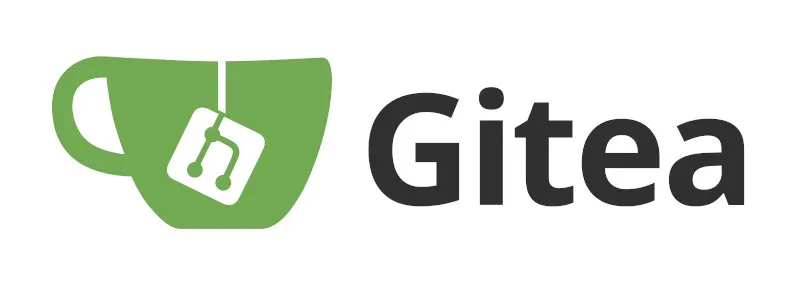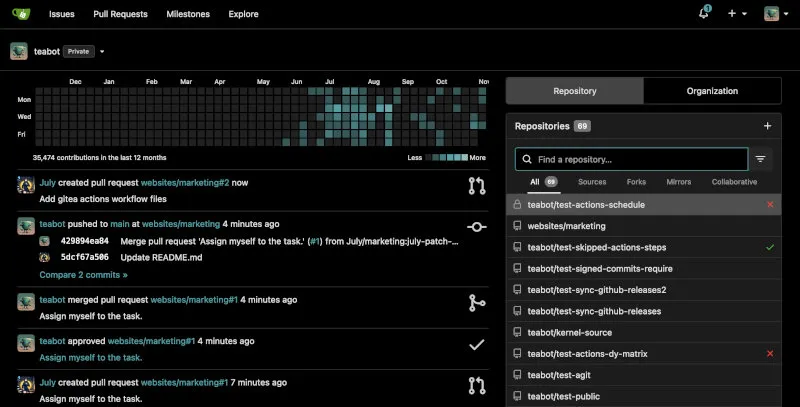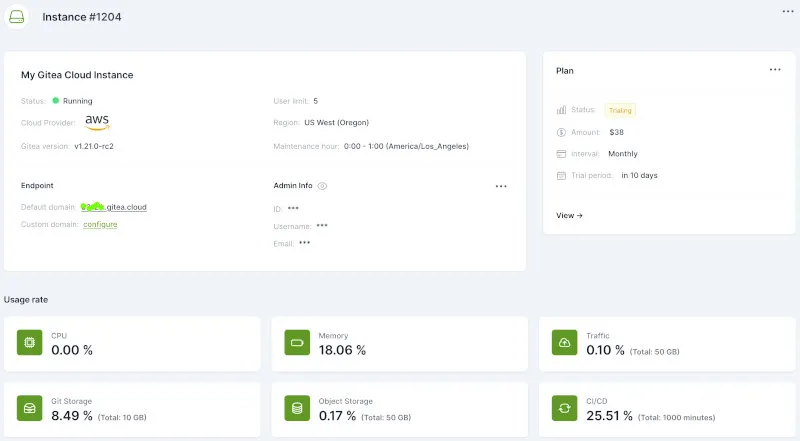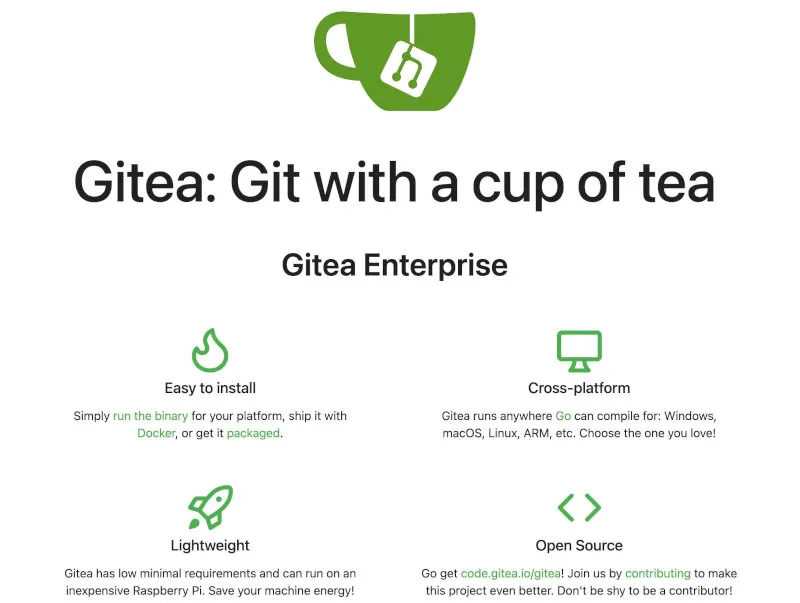
Gitea: An Ultimate Lightweight Self-Hosted Git Service
Table of Contents
- Key Features at a Glance
- The Gitea Philosophy: Who Is It For?
- GitHub vs. Gitea: A Quick Comparison
- Pros and Cons
- Gitea Cloud
- Gitea Enterprise
- Getting Started & Further Reading
- Frequently Asked Questions (FAQ)
- Conclusion
In the realm of self-hosted Git solutions, performance and ease of use are king. While heavyweights like GitLab offer a complete DevOps empire, many users simply want the core functionality of GitHub running on their own hardware, without the complexity or resource drain. This is where Gitea shines.
Forked from the Gogs project and now driven by a large and active community, Gitea is a free, open-source Git service written in Go. Its mission is to be the easiest, fastest, and most painless way to set up a self-hosted Git service. It achieves this by being incredibly lightweight, delivering a surprisingly rich feature set in a single, compact binary.
Key Features at a Glance
Gitea strikes a perfect balance between being lightweight and feature-rich, providing far more than just basic repository hosting.
| Feature | Description | Key Benefit |
|---|---|---|
| Extremely Lightweight | Written in Go and compiled into a single binary, Gitea has exceptionally low RAM and CPU requirements. | Can be run comfortably on low-cost hardware like a Raspberry Pi or a small VPS, making it accessible to virtually anyone. |
| Simple Installation | With no external dependencies (beyond a database), installation is as simple as downloading the correct binary for your OS and running it. | You can have a fully functional Git server running in minutes, a stark contrast to the complex setup of larger platforms. |
| Full-Featured Experience | Includes not just Git hosting but also issue tracking, pull requests, wikis, a container registry, and a package manager. | Provides a surprisingly complete, GitHub-like experience out of the box, covering the most common developer needs. |
| Integrated CI/CD (Gitea Actions) | A built-in CI/CD system that is compatible with the GitHub Actions syntax, allowing you to run automated workflows on your own infrastructure. | A game-changing feature for a lightweight platform, enabling powerful automation without relying on external tools like Jenkins. |
The Gitea Philosophy: Who Is It For?

Gitea’s philosophy is rooted in painless self-hosting and community-driven development. It aims to provide maximum value with minimum overhead, empowering users with full control over their code and infrastructure.
This makes it the perfect choice for:
Individuals and Hobbyists: The ideal solution for running a personal Git server in a home lab or on a small cloud instance.
Small to Medium-Sized Teams: A cost-effective and easy-to-manage private Git service that provides all the essential collaboration tools.
Resource-Constrained Environments: Its low resource usage makes it perfect for deployment on embedded devices, older hardware, or the cheapest VPS tiers.
Open-Source Advocates: For those who want a complete software development stack that is 100% free and open-source.
GitHub vs. Gitea: A Quick Comparison
The comparison highlights the trade-offs between a global SaaS platform and a lean, self-hosted solution.
| Aspect | GitHub | Gitea |
|---|---|---|
| Primary Focus | A global platform for community and enterprise collaboration. | A painless, lightweight solution for self-hosting Git. |
| Hosting Options | Cloud (SaaS) and Self-hosted (Enterprise). | Self-hosted only. |
| Resource Usage | N/A (SaaS) | Extremely low. A key design goal. |
| CI/CD | GitHub Actions (massive, cloud-hosted runners). | Gitea Actions (self-hosted runners, compatible syntax). |
Pros and Cons
Why You Might Choose Gitea
Unbelievably Lightweight and Fast: Being a single Go binary gives it a massive performance advantage and makes it trivial to deploy and update.
Surprisingly Full-Featured: The inclusion of CI/CD, package registries, and a container registry puts it well ahead of other minimalist options.
Vibrant Community and Active Development: Gitea has a very active community, ensuring it is constantly being improved with new features and security patches.
Familiar GitHub-like Interface: The UI is clean, intuitive, and immediately familiar to anyone who has used GitHub, eliminating any learning curve.
Potential Drawbacks
You Are the Administrator: The freedom of self-hosting comes with the responsibility of managing security, backups, and updates for your instance.
CI/CD Is Self-Hosted: While Gitea Actions is powerful, you must provide and manage the runners that execute the jobs, unlike the managed runners offered by GitHub.
No SaaS Option: If you don’t want to manage your own server, Gitea is not for you. There is no official cloud-hosted version.
Smaller Ecosystem: While it has great built-in features, it lacks the vast marketplace of third-party apps and deep integrations available for GitHub.
Gitea Cloud

Gitea Cloud is a fully managed Git hosting service offered by CommitGo, Inc., designed to simplify the deployment and maintenance of Gitea instances while retaining the core benefits of the open-source Gitea project. It provides a cloud-based solution with infrastructure-level isolation, making it ideal for teams and organizations that prioritize ease of use, security, and compliance without the burden of self-hosting.Gitea Cloud, Gitea Cloud Blog
| Feature | Description | Key Benefit |
|---|---|---|
| Managed Infrastructure | Gitea Cloud handles maintenance, backups, upgrades, and scaling, ensuring 24/7 availability. | Frees teams to focus on coding rather than server management. |
| Isolated Environments | Each instance runs in a private, isolated environment with no shared data unless explicitly permitted. | Enhances security and compliance, especially for regulated industries. |
| Custom Domain Support | Allows the use of custom domains and flexible organization/permission management. | Aligns with your organization’s branding and structure. |
| Managed CI/CD Runners | Includes managed runners for Gitea Actions, compatible with GitHub Actions syntax. | Simplifies automation workflows without needing to configure runners. |
| Flexible Pricing and Trials | Offers pay-as-you-go plans with discounts for startups, small teams, and non-profits, plus a 30-day free trial. | Accommodates various team sizes and budgets with easy scalability. |
Gitea Enterprise

Gitea Enterprise, also offered by CommitGo, is a premium, enhanced version of the open-source Gitea project, tailored for enterprise-level users. It builds on Gitea’s lightweight foundation with additional features for security, scalability, and customization, backed by dedicated support. It remains fully compatible with the open-source version, allowing seamless transitions.Gitea Enterprise, Gitea Enterprise News
| Feature | Description | Key Benefit |
|---|---|---|
| Branch Protection Inheritance | Allows organization-wide branch protection rules to apply across all repositories. | Simplifies security management for large teams. |
| Dependency Scanning | Automatically identifies vulnerabilities in open-source dependencies. | Enhances code security by proactively addressing risks. |
| Advanced Security Features | Includes IP Allowlist and mandatory two-factor authentication. | Strengthens instance and account security. |
| SAML Integration | Supports seamless integration with enterprise identity providers via SAML 2.0. | Simplifies authentication and authorization processes. |
| Audit Log | Provides a comprehensive history of user actions and system events. | Improves transparency and compliance tracking. |
| Enterprise Themes | Offers customizable UI themes tailored for enterprise branding. | Enhances user experience with personalized interfaces. |
| Premium Support | Includes dedicated support via email or online chat during the license period. | Ensures rapid assistance for enterprise users. |
Getting Started & Further Reading
Ready to experience the fastest self-hosted Git service? Explore Gitea with these official links.
Official Website: https://gitea.io/
Documentation: https://docs.gitea.io/
Live Demo: https://try.gitea.io/
GitHub Repository (for community interaction): https://github.com/go-gitea/gitea
Frequently Asked Questions (FAQ)
Q: What databases does Gitea support?
A: Gitea supports SQLite (default, no external setup required), PostgreSQL, MySQL, MariaDB, and MSSQL. SQLite is ideal for small setups, while the others are better for larger teams or production environments.
Q: Can Gitea scale for large teams or organizations?
A: Yes, Gitea can scale for larger teams when paired with a robust database (e.g., PostgreSQL) and proper server resources. However, it’s primarily optimized for small to medium-sized teams due to its lightweight design.
Q: How does Gitea Actions compare to GitHub Actions?
A: Gitea Actions uses the same syntax as GitHub Actions, making workflows portable. However, Gitea requires you to host your own runners, while GitHub provides managed runners, which may be more convenient for some users.
Q: Is Gitea secure for production use?
A: Gitea is secure when properly configured, with features like two-factor authentication and regular security updates from its active community. However, as with any self-hosted solution, you’re responsible for securing your server and keeping it updated.
Q: Can I migrate my repositories from GitHub to Gitea?
A: Yes, Gitea provides a built-in migration tool that allows you to import repositories, issues, and pull requests from GitHub, GitLab, and other platforms with minimal effort.
Conclusion

Gitea is a true gem in the world of open-source software. It masterfully delivers a fast, stable, and feature-rich Git experience without the bloat. It proves that you don’t need a heavyweight platform to get a modern development workflow. For anyone looking to take control of their code with a self-hosted solution that is a joy to use and manage, Gitea is not just an alternative; it’s a top-tier choice.